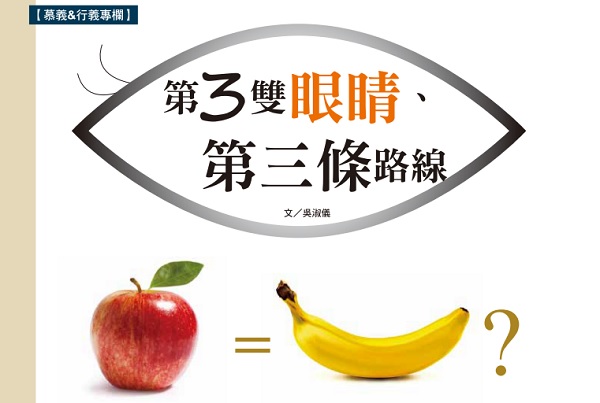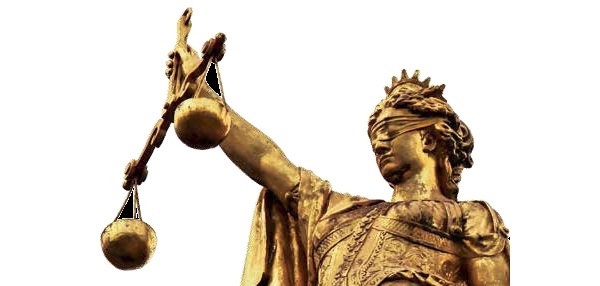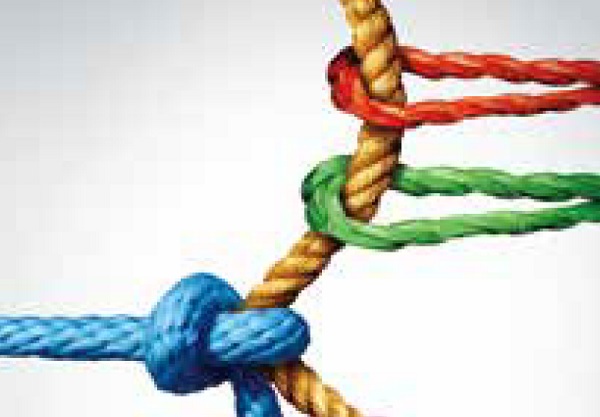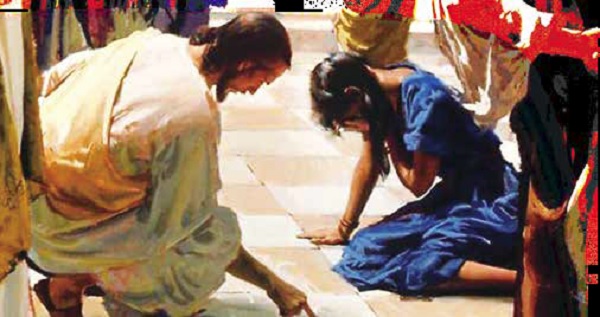The third pair of eyes, the third route
[Muyi & Xingyi Column]

Apple = banana?
A short video appeared on the CNN website of the United States. There was only an apple in the screen. The narrator asked: If someone repeatedly says that this is a banana, will the audience begin to doubt whether it is an apple or a banana? (Please seehttps://www.youtube.com/watch?v=IxuuIPcQ9_I. )
"Calling apples bananas" describes the strange phenomenon of today's culture: not only "post-truth", but also the era of "post-truth" - full of rhetoric that sees the good as the opposite and the opposite as the right, ideological differences between political parties, and values. Polarization; while calling for "tolerance and inclusiveness", insisting on one's own opinion, and any opinion that is different from one's own is a mistake.
However, "calling apples bananas" is not a new thing. It should be the "way" that humans have built cultural societies throughout the ages. The Chinese phrase "three people become a tiger" appeared as early as the Warring States Period. This seemingly absurd and unreasonable phenomenon has actually been repeated for thousands of years since the fall of our ancestors, both in ancient and modern times, both at home and abroad. It seems like an invisible rope holding back the course of human society, and it is euphemistically called the "mainstream of society." culture". Just like the Chinese belief that a woman's lack of talent is a virtue, Western European concepts such as men being strong and women being weak, men being dominant and women being auxiliary, have deceived, suppressed and exploited women for thousands of years; another example is the belief that black people are inherently inferior and have oppressed Africans. Isn’t it true that adhering to claims such as white supremacy are calling apples bananas based on tradition, religion, and pressure from public opinion?
Christians, should we re-examine the fruit in our hands with spiritual eyes? Is it a banana or an apple? How should we spiritually face the injustice caused by turning the opposite into the right?
Three stubborn discriminations
Injustice throughout the ages has brought untold destruction and pain to human society, but the following three major discriminations are the most significant:
Sexism
Today I am fortunate to see the rise of the #MeToo movement, which can no longer be reversed (for related articles, please refer to the 51st issue of this magazine "The Most Admirable Things in 2017")! But after being insulted and violated, is it not natural to seek justice? Why do we need a "movement" to justify it? This crime, which should be called "sexual assault," has actually been regarded as a "man's right" without explicit permission for thousands of years. Such words and concepts shield men and suppress women, making them a "silent" group! The result of "calling an apple a banana" has become a gender-based culture that requires no explanation and cannot be challenged throughout the ages. It is only today that the complaints of assaulted women have begun to gain an audience, have begun to be taken seriously, and have begun to receive positive responses. However, these voices are like sporadic sparks. In countries outside the first world, how many women continue to live in oppression and humiliation "as a matter of course"! Some believers even take the original description "You will desire your husband, and your husband will rule over you" (see Genesis 3:16) as a prescription for sexual relations, thereby interpreting it as a description of male self-power. Expansion, suppression of women.
racism
The issue of race can be called "America's original sin." The two cruel histories of the black slave system that has coexisted with the country since its founding, and the apartheid Jim Crow laws that followed the abolition of slavery, still exist like phantoms in every corner of American society today! Although the civil rights movement led by Martin Luther King and others in the 1960s was praised as a model of peaceful resistance and opened the door to the abolition of segregation policies, racial discrimination did not disappear overnight and remains stubborn today. Influence policies and form institutional discrimination. There are a disproportionate number of black inmates in prisons, the so-called fate of black teenagers who "go straight from school to prison." In this country, which is founded on Christianity and occupies a leading position in global politics, economy and culture, how can we blindly "call apples bananas" and think that this is the fault of black people?
classism
Countries such as India and the Middle East are typical examples in the past, but today the injustice of the disparity between rich and poor and the power gap in the world is becoming increasingly serious! But almost all famines in this century are man-made disasters. Just like Somalia and other countries that use political totalitarianism to oppress and exploit, which has caused cruel consequences; also like thousands of ethnic groups in countries such as Syria and Myanmar, who have been subjected to political persecution and genocide, and have been forced to flee their countries. , resulting in an unprecedented wave of refugees. Children and women were raped, humiliated, lived in despair of being slaughtered, and became victims of political struggles. In order to seek a stable living environment, they endured exploitation by human traffickers, and their dreams and lives floated in the sea. In the information age of the 21st century, a "global village" has been established, and international rescue could have responded immediately. There is no excuse to say "I don't know" or "I can't do it." It’s a pity that we haven’t seen any substantive and moral assistance so far. With such indifference and “calling apples bananas”, doesn’t it mean that we are neglecting the lives of these vulnerable groups?

▲Today, the gap between rich and poor in the world and the injustice of power gap are becoming more and more serious day by day.
The salvation history of "Creation-Fall-Redemption"
Creation - Human beings were originally created in the image of God. Regardless of race, class, or gender, they all enjoy the same honor and value, and receive the same mission in life.
Fall - After the fall of mankind, society was planned according to sinful nature, trampling and oppressing each other due to differences in gender, race, and class. Some people and certain groups see themselves as more honorable and valuable than others, thus depriving other people and other groups of their basic human rights and development potential. There are so many strengths and weaknesses, but these crimes of discrimination are normalized and rationalized by society!
Redemption - The redemption of Jesus is to bring the fallen culture back to the original intention of God's creation: "There is no distinction between Jew and Greek (race), free and slave (class), male or female (gender) , all are one in Christ” (Galatians 3:28).
The three major injustices that have existed since the fall of mankind: gender, class, and racial discrimination are all systemic and social crimes. These discriminations are manifested in the open through policies, and conveyed in the dark through people's thoughts, words and deeds. These discriminations are not limited to the "world" outside the church. If they do not think deeply and discern clearly, believers may normalize and rationalize discrimination through misinterpretations of the truth.
Jesus has accomplished redemption. Christians, how should you and I live out the original value of life, treat others with honor, and respond to social injustice from a spiritual perspective?
A quartet of responses to cultural injustice
It can be seen that social justice is not only an ideological issue, but also a theological and spiritual issue, which requires theological response and spiritual reflection. The following can provide a four-part response to "calling an apple a banana" and reversing the worldview:
Awakening─Cultivate observation and experience of social injustice;
Analysis─Analysis of society, culture, and world view of the issue of injustice;
Judgment - Understand the core issues and reflect on them from theological and spiritual perspectives;
Action─respond to social injustice and practice redemptive justice with action.
(1) Awakening─How to see?
Everyone's values and worldview are affected by history, culture and other backgrounds. The "physical eyes" look at the same thing, and over time, they follow what they have been taught in the past, and unconsciously see people and things with the "traditional eyes". These historical baggage gradually influence our decisions about what should and should not be done; what is appropriate and inappropriate; and how to observe, evaluate, and criticize.
Tradition and culture have naturally become the orthodox plan of society. It is not easy to detect and identify the distorted culture of "calling apples bananas" both at home and abroad in ancient and modern times. Whether it is an apple or a banana requires careful observation and discernment with eyes other than traditional culture - "seeing" with the "third pair of eyes" of truth. The example Jesus set was not “what to see” but “how to see”. In Matthew 5:28, Jesus’ Sermon on the Mount: “Whoever looks at a woman lustfully has already committed adultery with her in his heart.” At that time, the traditional culture unilaterally blamed and blamed women, but Jesus saw Adultery is formed in the heart of a man.
(2) Analysis─How to ask?
Life is a series of pursuits. The most important thing is not only finding the right answer, but also asking the right question!
When we look at this upside-down society, what should we “ask”? From what angle should the question be asked? Why this and not that? Did something go wrong? What went wrong? In other words, we should ask questions from a third perspective.
During the four hundred years when the Egyptians had enslaved the Hebrews, Moses, who grew up in the Egyptian palace, thought to himself: "Why does one nation have the privilege to enslave another nation?" Moses "refused to be called Pharaoh's daughter when he grew up. Son of God, he would rather suffer with the people of God...” (See Hebrews 11:24-25). In the end, he accepted God's call, led the Hebrews out of Egypt, and completed the greatest act of social justice in history that shook the world!
(3) Judgment─What do you think?
The core issues of social injustice are all issues of the ultimate value of life and soul, and their identification and exploration must begin with theological reflection. What is right and what is wrong in the current social issues needs to be determined from the perspective of Jesus’ salvation.
If we look at today's American society, this is an era in which there is serious opposition between the left and the right. The society is extremely diverse and at the same time extremely individualized. The criticism of mainstream culture is still framed in political thinking that is either "left" or "right". In this culture that "calls apples bananas" and does not distinguish between right and wrong, to find the answer, we have to let go of our usual binary judgment method and no longer only see you as wrong and me as right. Instead, we need to step out of traditional thinking, reinterpret the Bible from the category of God's salvation history of "creation-fall-redemption", and use the third perspective to reflect and clarify God's will - "Left" has the opposite of "Left" Whether it is right or wrong, "right" has its pros and cons. It all depends on how Christ's redemption restores God's original intention of creation.

▲The mainstream culture of society seems to be a rope that affects the direction of society.
(4) Action─How to do it?
Action is prompted by the heart; the words and deeds of Christ are our motivation and motivation. When Jesus was on earth, although he often stood in opposition to traditional culture, He still taught us to connect with culture. How to be in opposition to culture and still stand side by side with culture? Serving the culture while rebelling against it? Jesus became flesh and "took the form of a servant, being made in the likeness of men" (see Philippians 2:7). This is the identification and connection with the object of service.
In the face of social injustice, Jesus' consistent strategy is to identify with the pain and disaster of the world: He often stands with the poor, the humble, the abandoned, the marginalized, the outsiders, "tax collectors and sinners"; Make friends with those who are helpful and those of lower social class. He also requires this of Christ's followers, even saying: "As you have done these things to one of the least of these my brothers, you have done them to me." (See Matthew 25:40)
Jesus not only wept with those who wept, but He also bore His own pain in order to redeem us who suffer from sin and to call us to comfort the suffering of the world with God’s comfort. This is the true meaning of the cross: "Surely He has borne our sorrows and carried our sorrows... By the chastisement of Him we have peace; by His stripes we are healed." (See Isaiah 53. :4-5) Only the way of the cross can truly bring answers to unjust social culture: broken relationships between people can be completely reconciled; injured hearts can be completely healed; and the conscience of the offender can be truly forgiven! This is the third route of Jesus - the way of the cross! This is also the route to take to fight against social injustice!

▲The third way pointed out by Jesus is the way of the cross of sharing the burden and redemption.
third route
Instead of following traditional concepts, we analyze social culture with a third pair of eyes. Only through awakening, observation, judgment and action can we understand the shocking lessons of the third route of Jesus' "Sermon on the Mount".
However, this third route is in opposition to the entire culture and tradition!
When the crowd brought the adulterous woman to Jesus (see John 8:1-11), we can see how He looked at the social culture at that time, "How did he see it?", "How did he ask it?", "What did he think about it?" , "How to do it?":
When social leaders' "view" of adultery was to "stone her to death," Jesus looked at adultery with another pair of eyes and "asked": "Which of you is without sin? Let's stone her first!" Jesus Remind everyone that it takes two people to commit adultery! The aggressive law enforcers finally left one by one. Jesus said to the woman: "I do not condemn you...don't sin again from now on!" It is God's ultimate and only purpose for people to be forgiven and healed!
When we face the so-called traditional social culture, how much we need to use a third pair of eyes to think carefully about theology and spiritual life; how much we need to use a third line to uphold the truth and uphold divine righteousness!

▲Does the church care about the issues that Jesus cared about? While condemning individuals, does it ignore social injustice?
How much of the issues that Jesus cared about are paid to the church today? Furthermore, while the church condemns individual sins, it ignores and condones unjust social crimes. Isn’t it just like the law enforcers who were ready to throw stones at adulterous women? In the face of injustice, we should not bow our heads or compromise. The example of Jesus' third route is not an eye for an eye or a tooth for a tooth, but confrontation with peace, melting hatred with respect, and transforming the enemy with love! He came to redeem, not to condemn.
In the following series of articles in the "Muyi & Xingyi Column", I hope that readers will continue to ponder the issue of social justice from scriptures and examples, and on the basis of spiritual shaping. We hope that Christians will be inspired and inspired to speak out for the truth and act for justice.
 Wu Shuyi (Lily Lee) has taught mathematics at American universities for more than 20 years. Bachelor of Urban Mission and Master of Apologetics from Westminster Theological Seminary. Co-author of "Give Me Back the Plenty of Eden" and "Reconciliation of the Sexes". One of the founders of Christ Abundance Fellowship, former chairman of the board of directors and current president. He once served as the International Board of Directors and Chairman of the Executive Board of Jiao Sheng Evangelistic Association, the founder and Chairman of the Board of Directors of New York Refresh Care Center, one of the founders of China Children’s Village Ministry, and served as a director, committee chairman and hospital supervisor. In 2007, he received the Lifetime Achievement Award from Christians for Biblical Equality International (CBE).
Wu Shuyi (Lily Lee) has taught mathematics at American universities for more than 20 years. Bachelor of Urban Mission and Master of Apologetics from Westminster Theological Seminary. Co-author of "Give Me Back the Plenty of Eden" and "Reconciliation of the Sexes". One of the founders of Christ Abundance Fellowship, former chairman of the board of directors and current president. He once served as the International Board of Directors and Chairman of the Executive Board of Jiao Sheng Evangelistic Association, the founder and Chairman of the Board of Directors of New York Refresh Care Center, one of the founders of China Children’s Village Ministry, and served as a director, committee chairman and hospital supervisor. In 2007, he received the Lifetime Achievement Award from Christians for Biblical Equality International (CBE).
